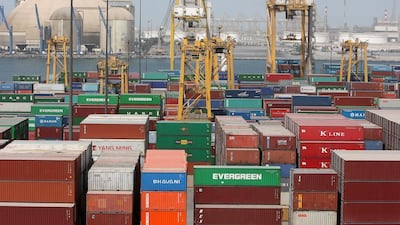DP World, one of the biggest port operators globally, may resume development next year of the US$1.6 billion fourth terminal at its flagship Jebel Ali port, which was put on hold last year because of a softening in the container shipping market.
The Nasdaq Dubai-listed company said last year it was slowing down work in Jebel Ali, the biggest port in the Middle East and North Africa, by postponing new additions to Terminal 3 into this year and putting off the construction of phase one of Terminal 4 which was scheduled for completion next year.
"Current capacity at Jebel Ali is 18 million TEU (twenty-foot equivalent units). At the same time, 1.3 million TEU will be added to T3 in the second half of 2017," Sultan bin Sulaymen, DP World's chairman, said in written answers to The National's questions.
"T3 will have a capacity of 3.8 million TEU and will be the world's largest semi-automated facility. Once operational, total capacity at Jebel Ali will increase to 19.3 million TEU. Meanwhile, T4 expansion will take place in 2018 scheduled to market demand."
DP World announced in 2015 that it would add 3.1 million TEU in Jebel Ali by building phase one of the fourth terminal, increasing overall capacity to 22.1 million TEUs by 2018.
At the time, Mr bin Sulayem said construction of Terminal 4 was in response to customer demand for greater capacity and in anticipation of an increase in trade in the lead-up to Expo 2020.
Mr bin Sulayem pointed to the stabilisation of volumes at Jebel Ali as a positive trend that will improve the port operator's overall performance this year. DP World's UAE ports, which included Fujairah container terminal before the concession ended this year, handled 3.7 million TEU in the first quarter, growing 1.8 per cent compared with the same period last year.
"We are pleased to see the recent stability in the UAE and as we look ahead into 2017, we expect our new developments in Rotterdam (Netherlands), Nhava Sheva (India), London Gateway (United Kingdom) and Yarimca (Turkey) to drive growth in our portfolio," said Mr bin Sulayem.
"The industry has faced some issues with lower commodity prices, currency fluctuations and political events. This has had an impact on trade growth, but we remain positive on the medium and long-term growth outlook for our industry."
DP World's gross container volumes grew by 5.7 per cent year-on-year on a reported basis, ahead of the industry estimate of 2.6 per cent throughput growth for the first quarter of the year, beating estimates from Egyptian investment bank, EFG Hermes. Its terminals around the world handled 16.4 million TEU between January and March compared with 15.5 million TEU a year earlier. On a like-for-like basis, which does not include volumes from newly opened terminals, the throughput grew 5 per cent in the first quarter.
Outside the UAE, the port operator is scouring for new assets and developments to help diversify its portfolio. For example, in May it signed an agreement with India's National Investment and Infrastructure Fund to invest in the country's logistics center.
"We are seeking opportunities in the country worth over US$1 billion over the next few years," said Mr bin Sulayem. "This will be aimed at the development of port infrastructure of the Sagarmala project, creation of the Delhi-Mumbai Industrial Corridor, river transportation and cold chain storage, investing in port-led special economic zones, free trade zones, ICDs and cruise terminals."
The port operator is also scouting for investment opportunities in Russia, where it has a joint agreement with government-owned Russian Direct Investment Fund to invest up to $2bn in ports, transport and logistics
In December 2016, DP World also announced a partnership with Canadian pension fund manager Caisse de dépôt et placement du Québec to create an investment vehicle that will invest $3.7bn in global ports, excluding the UAE.

